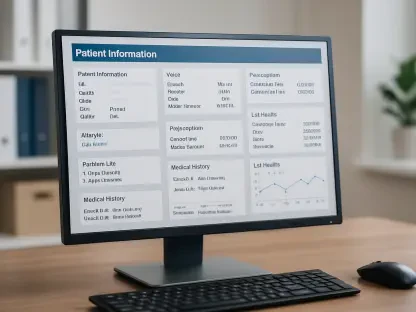Artificial intelligence has become synonymous with the rapid evolution and innovative transformation of the healthcare industry. A substantial influx of venture capital is fueling this innovation, allowing AI to introduce groundbreaking developments in healthcare delivery, patient diagnostics, and data management. This technological advancement is happening in a world challenged by economic fluctuations and shifting policy landscapes. The transformative potential of AI in healthcare, albeit surrounded by complexities, is beginning to reshape the fundamental operations of the healthcare sector. As AI drives forward, the significant impact it has on investment trends and strategic movements becomes increasingly apparent.
Navigating the Expanding Landscape of Digital Health
Boost in Venture Funding Through AI
The resurgence of venture funding in the digital health sector reflects a renewed confidence among investors. With $6.4 billion invested in the first half of 2025, the industry illustrates far-reaching trust in its potential for growth and innovation. AI stands at the center of this growth, attracting 62% of total investments and highlighting its crucial role in redefining healthcare. The average deal size has shot up to $26.1 million, a remarkable rise driven by substantial investments in later-stage funding rounds, predominantly featuring AI-enabled startups. These firms, often at the forefront of AI innovation, are leading the charge by securing an average of $34.4 million per funding round.
AI’s influence permeates all levels of venture capital funding, marking a shift towards an innovation-centric approach within healthcare. Both early and later-stage funding rounds see AI startups drawing remarkable investor attention. Startups focusing on non-clinical and clinical workflows find themselves at the receiving end of significant backing, collectively pulling in $3.8 billion. This emphasis on streamlining operations through AI reflects the broader ambition to enhance operational efficiency and medical effectiveness. Data infrastructure also commands considerable attention, securing $893 million, as investors see the opportunity to reform the very backbone of digital healthcare services.
Technological Advancements and Market Dynamics
In the post-pandemic context, the digital health sector shows signs of maturation despite the backdrop of global instability. AI’s contributions, ranging from improved clinical decision-making to efficient resource allocation, are fueling a perception of its capability as a healthcare game-changer. The reopening of the IPO market underscores this shift, as seen with Hinge Health and Omada Health’s public listings. These companies epitomize AI-driven innovation, with Hinge Health refining automated care delivery and Omada Health integrating AI to optimize both coaching workflows and consumer-facing tools. The IPO trajectory symbolizes a broader understanding that AI is not merely a technological benefit but an economic catalyst.
Mergers and acquisitions within the digital health sphere emphasize AI’s critical role in strategic expansion and innovation. By the midpoint of 2025, 107 deals had been sealed, pointing to a likely doubling of such activities. This trend is aligned with a conscious move towards blending AI-native startups with established entities. Private equity’s strategic roll-up maneuvers further manifest this intent, aiming to capitalize on AI’s potential to achieve scalability and operational coherence. These activities place AI at the heart of transformative strategies designed to enhance both economic and health outcomes across the sector.
The Complex Interplay of Policy and Economics
Shifting Regulatory Landscapes
Navigating the intricate web of healthcare policy has become an exercise in adaptability and foresight, especially with AI’s unprecedented integration into healthcare. The “Make America Healthy Again” initiative introduces a fresh set of expectations for AI deployment. Although the Trump administration’s favoring of AI deregulation and cost reduction approaches aims to foster innovation, it also presents substantial challenges. Potential changes in frameworks like Medicaid and the existing Obamacare marketplace could influence insurance plans for millions, influencing how digital health firms position themselves strategically.
The juxtaposition of innovation with regulatory uncertainties results in a cautious yet ambitious push toward embedding AI in healthcare. Such policy-driven changes directly affect market dynamics, prompting companies to reconsider their positioning and operational models. Engaging proactively with policymakers becomes imperative as AI-driven solutions tackle pressing healthcare needs amidst a rapidly changing environment. By aligning innovation with policy objectives, the industry can potentially bridge the gap between cutting-edge technology and wider accessibility, ensuring sustainable growth and robust healthcare systems.
The Economic and Strategic Reality
The intersection of economic pressures and strategic considerations continues to define the contours of AI’s impact on healthcare. While the prospect of AI facilitating healthcare advancements is enticing, aligning these innovations with broader market realities remains a formidable challenge. Balancing technological evolution with inherent economic constraints presents both opportunities and obstacles. Ensuring continued investment requires articulating AI’s value proposition in a manner that resonates with stakeholders while aligning with market needs.
Private equity and venture capital firms capitalize on AI’s momentum by investing in startups with strong potential for achieving scale and efficiency. As firms navigate this financial landscape, strategic collaborations become vital for success. Bridging innovation and practicality enables healthcare firms to address consumer needs more effectively. By embedding AI’s potential within existing frameworks, firms can foster growth, resilience, and sustainability while navigating economic complexities. A balancing act between adaptation and expansion provides a foundation for AI’s meaningful integration into healthcare, extending its transformative reach in the process.
Charting the Path Forward
Artificial intelligence is synonymous with the fast-paced evolution and innovative changes occurring in the healthcare sector. A surge in venture capital investments is propelling these advancements, enabling AI to create revolutionary changes in how healthcare is delivered, patient diagnoses are conducted, and data is managed. AI’s growth is unfolding amidst global challenges, such as economic uncertainties and shifting policy frameworks. Despite the complexities involved, the transformative capabilities of AI are starting to alter the core functions of healthcare systems. As AI progresses, its substantial influence on investment patterns and strategic directions is becoming increasingly evident. This suggests that AI is not just an auxiliary tool; it stands as a central player in crafting the future landscape of healthcare. Stakeholders across the industry are paying close attention to how AI can enhance efficiency, improve patient outcomes, and streamline operations, all while navigating the ever-changing terrain of healthcare challenges.









